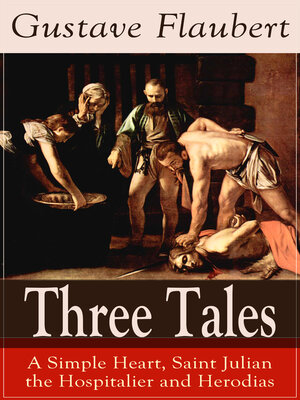Three Tales
ebook ∣ A Simple Heart, Saint Julian the Hospitalier and Herodias: A Classic of French Literature from the prolific French writer, known for Madame Bovary, Sentimental Education, Bouvard et Pécuchet and November
By Gustave Flaubert

Sign up to save your library
With an OverDrive account, you can save your favorite libraries for at-a-glance information about availability. Find out more about OverDrive accounts.
Find this title in Libby, the library reading app by OverDrive.



Search for a digital library with this title
Title found at these libraries:
| Loading... |
This carefully crafted ebook: "Three Tales: A Simple Heart, Saint Julian the Hospitalier and Herodias" is formatted for your eReader with a functional and detailed table of contents. "A Simple Heart" is a story about a servant girl named Felicité. After her one and only love Théodore purportedly marries a well-to-do woman to avoid conscription, Felicité quits the farm where she works and heads for Pont-l'Évèque, where she picks up work in a widow's house as a servant. It was inspired by several events in Flaubert's own life: he also lived in a farmhouse in rural Normandy, he also was adrift in his studies, much like Paul. Most importantly, he suffered an epileptic fit in the same way that Félicité does in the story. "The Legend of Saint Julian the Hospitalier" is a story about Julian the Hospitaller. He is predicted at birth to do great things. His father is told that he will marry into the family of a great emperor, while his mother is told he will be a saint. It was inspired by a large stained glass window at Rouen Cathedral. Flaubert deliberately made his story markedly different from the story told in glass. "Hérodias" is the retelling of the beheading of John the Baptist. It starts slightly before the arrival of the Syrian governor, Vitellius. Herodias holds a huge birthday celebration for her second husband, Herod Antipas. Unknown to him, she has concocted a plan to behead John. It is based on the biblical figure of the same name. Flaubert based the section on the dance of Salomé from a bas-relief also at Rouen Cathedral, and his own experience watching a young female dancer while in Egypt. Gustave Flaubert (1821-1880) was an influential French writer who was perhaps the leading exponent of literary realism of his country.






